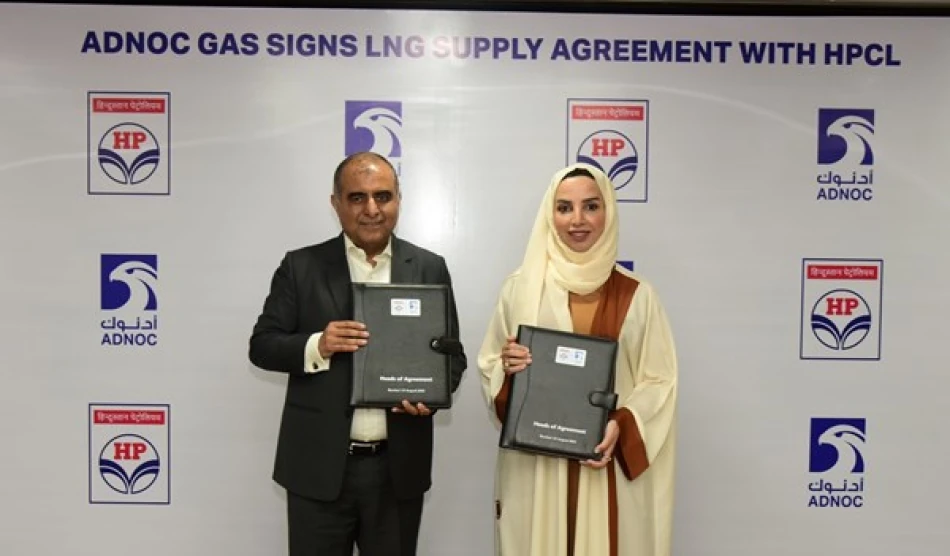
ADNOC Gas Inks Deal to Supply LNG to India's Hindustan Petroleum
UAE's ADNOC Gas Deepens India Energy Partnership with Third Major LNG Deal
ADNOC Gas has signed its third major liquefied natural gas supply agreement with an Indian energy company in just over a year, highlighting the UAE's strategic push to capture Asia's growing energy demand while supporting India's ambitious transition to cleaner fuels. The 10-year deal with Hindustan Petroleum Corporation will supply 0.5 million metric tons annually, reinforcing the Gulf state's position as a reliable energy partner for the world's most populous nation.
Strategic Expansion in Asia's Fastest-Growing LNG Market
The agreement with Hindustan Petroleum marks ADNOC Gas's continued expansion into Asian markets, where LNG demand continues to surge as countries seek cleaner alternatives to coal and oil. This deal follows recent agreements with Indian Oil Corporation and GAIL Limited, creating a comprehensive supply network that positions the UAE as a key energy security partner for India.
The timing reflects broader market dynamics in Asia, where countries are scrambling to secure long-term LNG supplies amid global energy volatility. Unlike spot market purchases that expose buyers to price swings, these decade-long contracts provide India with supply certainty while guaranteeing ADNOC Gas steady revenue streams.
India's Clean Energy Ambitions Drive Demand
India's aggressive push to increase natural gas's share in its energy mix to 15% by 2030 is creating substantial import opportunities for LNG suppliers. Currently, natural gas accounts for roughly 6% of India's energy consumption, leaving significant room for growth as the country seeks to reduce its heavy reliance on coal and oil imports.
This transition strategy mirrors similar moves by other Asian economies, including South Korea and Japan, which have used LNG as a bridge fuel while developing renewable energy infrastructure. For India, with its massive industrial base and growing population, natural gas offers a practical pathway to reduce emissions while maintaining economic growth.
UAE Leverages Geographic and Infrastructure Advantages
ADNOC Gas will supply the LNG from its Das Island facility, a 6-million-ton-per-year plant that ranks as the world's third-oldest LNG facility. Despite its age, the plant has maintained consistent operations, shipping over 3,500 LNG cargoes globally since production began.
The UAE's geographic position provides significant logistical advantages for serving Asian markets compared to competitors in Qatar, Australia, or the United States. Shorter shipping distances translate to lower transportation costs and more flexible delivery schedules, making UAE LNG particularly attractive to price-sensitive buyers like India.
Market Implications and Regional Competition
These consecutive Indian deals signal ADNOC Gas's intention to build lasting market share rather than compete solely on spot pricing. This approach contrasts with more opportunistic suppliers who focus on short-term contracts during price spikes.
The strategy also positions the UAE to compete more effectively with Qatar, the world's largest LNG exporter, which has traditionally dominated long-term supply relationships in Asia. By securing multiple Indian partners, ADNOC Gas is diversifying its customer base while reducing dependence on any single buyer.
Fatima Al Nuaimi, CEO of ADNOC Gas, emphasized that the deal demonstrates "the established partnership between the UAE and India in the energy sector" and supports India's goal of increasing natural gas's role in its energy mix.
Energy Security in an Uncertain World
For India, diversifying LNG suppliers reduces dependence on any single source and provides leverage in price negotiations. The country has learned from Europe's recent experience with Russian gas, where over-reliance on one supplier created vulnerabilities during geopolitical crises.
These agreements also support India's broader energy security strategy, which includes developing domestic gas production, building strategic reserves, and establishing multiple import partnerships across different regions. The UAE deals complement existing relationships with suppliers in Qatar, Australia, and the United States.
Most Viewed News

 Layla Al Mansoori
Layla Al Mansoori






